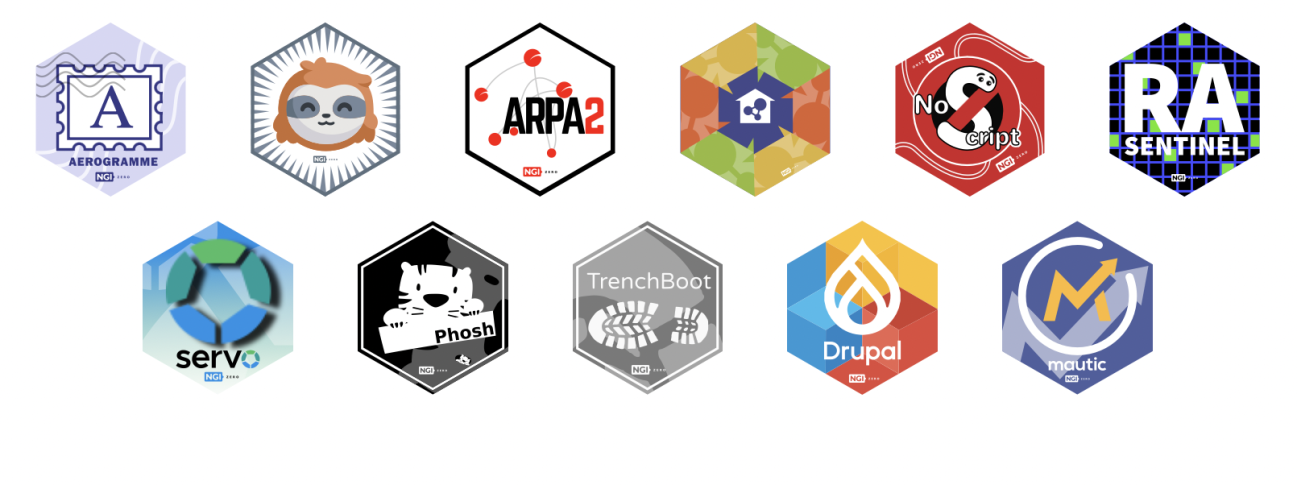
This piece was originally published at nlnet.nl
We are happy to announce that 29 projects are selected for NGI Zero Commons Fund sixth open call. We congratulate the developers and engineers and thank them for their contribution to an open, resilient and human-centered internet. The selection covers the entire technology stack from trustworthy open hardware, to services & applications providing user autonomy. Read on or skip ahead to the introduction to each of the projects.
Toward a digital commons
The NGI Zero Commons Fund provides grants to people who help build the digital commons. Because all projects are free and open source technologies, all outcomes can be freely used, studied, shared and moderated by anyone. Together they provide the building blocks for a information and communication infrastructure that promotes digital sovereignty and serves the common good.
Stacking up building blocks
The projects selected by NLnet in this call round serve a rich variety of use cases, from collaborative real-time video editing to a decentralised consumer market place and from an open hardware gadget to detect malicious attacks on Wifi access points to a natively geo-distributed groupware server (e.g. secure email, shared address books and calendars) with high availability guarantees and at rest encryption. Another project helps musicians and other artists to connect with audiences. Other important and practical contributions that will be worked on — range from software that can be used by educational institutions and hospitals for cooperative scheduling to an independent browser engine and from user-facing tools like an open source self-hostable voice assistant to low-level mechanisms to protect a computer's boot payload with dynamic Roots of Trust.
So far 226 projects have received funding in the six rounds of the NGI Zero Commons Fund. A new call opens every two months, the current call closes December 1. NGI Zero, the coalition of 16 non-profits led by NLnet foundation, has been responsible for five other funds besides the Commons Fund. Over all, the coalition has supported over one thousand Free and Open Source projects. The NGI Zero Commons Fund is financed by the European Commission as part of the Next Generation Internet initiative.
Meet the new projects!
Trustworthy hardware and manufacturing
- uberSDIO — Add UHS-II to open hardware SD controller
- RA-Sentinel AoA — Direction aware sensing of RF-based attacks
- RA-Sentinel Code Liberation — Royalty free synthesizable Verilog code for signal processing
Network infrastructure incl. routing, P2P and VPN
- EcoNet Linux — Add Linux kernel support for EcoNet MIPS processors
- WPA3 support for OpenBSD 802.11 wireless — Wi-Fi Protected Access 3 for OpenBSD
Software engineering, protocols, interoperability, cryptography, algorithms, proofs
- Adding 32-bit ARM support to QBE and Hare — Full Arm32 support for QBE compiler
- GoActivityPub — Help people develop Fediverse software in Go
- Husk — Pass-through solution for automatic OpenPGP encryption
- Latest OMEMO support to Converse.js with libomemo.js — E2EE for web-based XMPP client
- NoScript Commons Library: Surrogate Scripts — Reusable script replacement functionality for privacy/security browser extensions
- Servo WebAPIs for Service Worker — Non-blocking, async Service Workers for Servo browser engine
- Support for 64-bit integer expressions in Kaitai Struct — Cross-language code generation for binary parsing
Operating Systems, firmware and virtualisation
- Port Phosh to GTK4/libadwaita — Open source user interface for mobile phones
- allowd — Memory-safe policy rules using D-Bus
- EcoNet Linux — Add Linux kernel support for EcoNet MIPS processors
- Reproducible bootstrap path for 'Node.js' based on GNU Guix — Build Node.js from source with Guix
- TrenchBoot - DRTM launch between coreboot and UEFI payload — Protect coreboot payload with dynamic Roots of Trust
- WPA3 support for OpenBSD 802.11 wireless — Wi-Fi Protected Access 3 for OpenBSD
Measurement, monitoring, analysis and abuse handling
- RA-Sentinel AoA — Direction aware sensing of RF-based attacks
- RA-Sentinel Code Liberation — Royalty free synthesizable Verilog code for signal processing
Middleware and identity
Decentralised solutions, including blockchain/distributed ledger
Data and AI
Services + Applications (e.g. email, instant messaging, video chat, collaboration)
- Miru Collaborative Video Editor — Local-first video and AR editing
- Hubzilla performance improvements — Make Hubzilla more efficient and expand Superblock
- GoToSocial performance & connectivity — Advanced moderation and federation features for GoToSocial
- PdfDing — Webbased selfhosted PDF manager, viewer and editor
Vertical use cases, Search, Community
- Drupal ActivityPub Social Recipe — Add ActivityPub capabilities to existing Drupal sites
- Federating Mirlo — Connecting artists and audiences with ActivityPub
- flohmarkt — Self-hostable web app for creating, sharing and answering classified ads
- flop! — Automatic generation of optimised time rosters
- GoActivityPub — Help people develop Fediverse software in Go
- Mautic Portability Phase 2 — Portable marketing campaigns for Mautic
- Parley — Rich text layout and editing library
- Waytale — Spatially organized 2D social space with video chat
If you applied for a grant
This is the selection for the April call of the NGI Zero Commons Fund fund only. We always inform allapplicants about the outcome of the review ahead of the public announcement, whether they are selected or not. If you have not heard anything, you probably applied to a later call or a different fund that is still under review.
Still hungry for more projects? Check out the overview of all our current and recent projects...
Inspired? If you are working on a project that contributes to the Next Generation Internet you can submit a proposal. The next deadline is December 1st 2025.
Acknowledgements
The NGI0 Commons fund is made possible with financial support from the European Commission's Next Generation Internet programme, under the aegis of DG Communications Networks, Content and Technology (grant agreement No. 101135429). Additional funding is made available by the Swiss State Secretariat for Education, Research and Innovation (SERI).